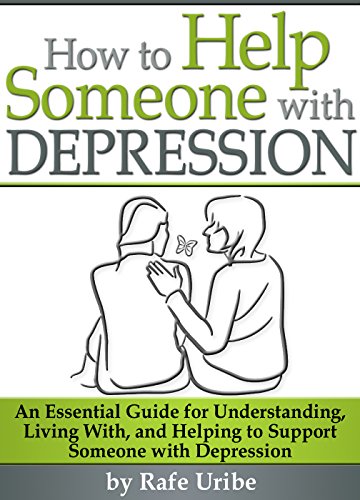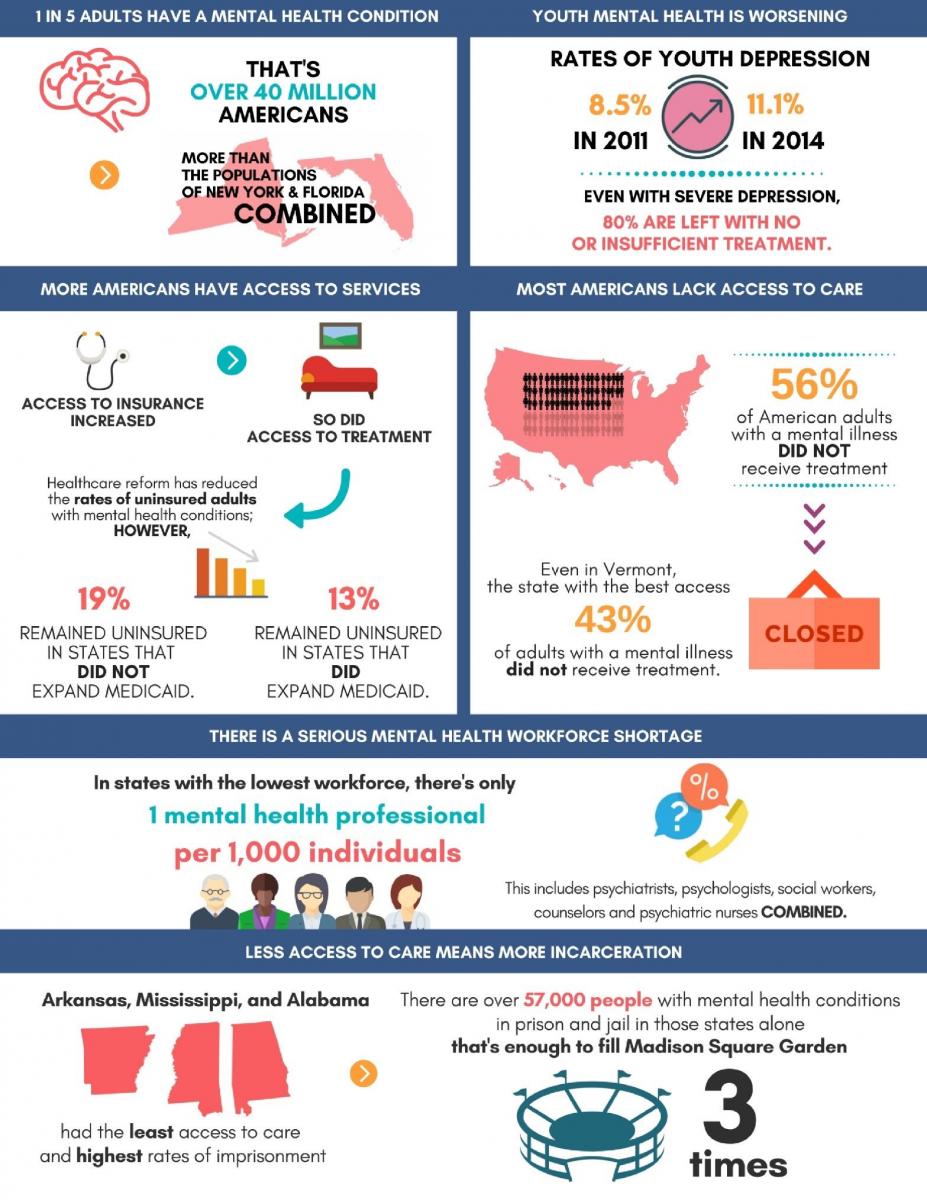
Mental health services need more funding. But where do you start? What are the costs and obstacles to treatment? What resources are available? How do you know what to do if you're suffering from an emotional or psychological disorder? Let's take a look at these questions together, and talk about what you can do in order to get the help you need. You will hopefully discover new ways of thinking about mental health services.
Treatment
There are two main types of mental health services. Outpatient care is for mild mental illness symptoms. It is available to individuals of any age, including couples and families. Another option is residential treatment. This provides specialized services to people with more severe conditions such as eating disorders and substance use disorders. This article will give you an overview of each type. This article will also include helpful resources for people who are looking into treatment options.
There are many services that can be provided, such as outpatient and inpatient therapy, medication management and medication management. Community mental health centers, also known as Mental Health and Mental Retardation Centers, treat low-income individuals and provide a variety of support services. A number of these facilities can be found in North Texas. These facilities offer a range of mental health services. However, each one is intended to cater for a broad population. Many providers offer services for the homeless and the mentally ill as well as people who are suffering from addictions and other mental illnesses.
Costs
Although mental disorders are becoming more expensive globally, we still don't know enough about them. Complex treatment costs are difficult to estimate accurately and data is not adequate. Estimates of the economic costs of mental disorders vary due to a variety of factors, including incomplete definitions, unreliable populations, poor service use and analytic tools. The accumulation of reliable data is possible thanks to improved epidemiological techniques. Let's consider the costs of mental health services and the corresponding health care system.

The study looked at three different models of health care insurance and found that prepaid plans facilitate use of specialty mental health services. Prepaid plans are lower in terms of cost for mental health care treatment as a proportion of membership. Moreover, they show a shift in costs toward outpatient care. Many employers in the United States are shifting to these models to lower their mental health care costs. However, these new models may not reduce costs in the fullest extent.
Barriers to seeking out help
The current study looked at the association between clinical characteristics, mental disorders and likelihood of getting treatment. Researchers found that three or more disorders, college-related characteristics and treatment-related characteristics were important predictors of treatment barriers. The most significant associations were made for patients with suicidal ideations, generalized an anxiety disorder, and broadmania. Results show that the presence of any one or more clinical characteristics is strongly associated with barriers to treatment, including depression.
The majority of studies focused on structural barriers, but several attitudinal barriers were also reported. The most common barriers identified were the need to work on the problem oneself, the desire talk with friends and the embarrassment that comes with seeking out help. The lack of access to mental health services and the stigma associated with mental illness were less frequently reported. There were less mentions of stigmatization or limited knowledge regarding mental illnesses.
Resources available
The right place to find resources on mental health issues is here. The National Institute of Mental Health has resources available on the Internet that are designed for young adults and adolescents. These resources include everything you need to know about mental health and how to help a friend or family member. The resource includes links to advocacy opportunities and peer networks. These resources can be printed to help you answer questions about someone's mental state.

The Center for Global Mental Health also offers resources for people living in other countries. You can also visit Canadian Alliance on Mental Illness and Mental Health (CAMIMH) for more information on mental healthcare services. These organizations provide support for people who require mental health services. These organizations are a great place to start seeking help if you are experiencing symptoms of a mental illness or are dealing with a difficult situation. These organizations can help guide you to the best resource.
FAQ
Why is mental health important?
Everyone's mental health is important. Mental health is crucial for all people. Maintaining a healthy mind is crucial.
If we are not feeling well mentally, our bodies will start to show signs of stress. This could cause health problems, such as stomach aches, backaches, headaches, and other issues. Our bodies and minds must be well looked after.
If I feel depressed, is there anything wrong?
Depression is a very common problem for teens. However, it's important to realize that many teenagers struggle with depression.
This doesn't necessarily mean you're weak or insane. Most people who feel depressed don’t realize it. Depression is a medical condition.
There are many types of depression. Some people feel only sadness, while some others experience other emotions. There are different levels of severity.
Some people experience mild depression, while others have severe cases. It's important to understand that depression isn't always bad. Sometimes, depression helps us to cope with stressful events.
If you feel constantly tired or sad, consult a doctor. Your doctor can diagnose and decide if you require treatment.
What can you do if you are experiencing mental health issues
If you are suffering from any type of mental illness, it is important to seek professional help. It is possible that you have been subject to abuse or trauma in the past. This could have affected your perception of yourself.
You may also be suffering from an eating disorder, addiction, or another type of mental illness. These disorders can lead to severe life-altering consequences.
You shouldn't attempt to handle them yourself. Talk to someone who is familiar with the subject. A professional therapist will be able to provide you with the support and guidance that you need in order to overcome these problems.
What are the causes of mental health problems among adolescents?
Adolescence marks a period in which we begin to develop our identities. We start to define who we are as individuals and how we fit into society.
These times are also a good time to make new friendships or romantic connections. These experiences can cause stress.
Normal stress is normal. However, if you feel stressed beyond your usual levels, you should seek professional help.
Although you may think you can handle it all on your own sometimes you need someone to talk to.
During times of stress, your family members and friends can be there for you. You may find them able to offer support and help you deal with stress.
You could try meditation or exercise. Both activities can help reduce stress.
Additionally, you might consider joining a club such as a team sports or church. You'll meet new people and make new friends.
How can you improve your wellbeing?
The state of being well is defined as the "state of physical, mental and spiritual well-being." Our well-being is affected by many factors, including family, work and health. Your first step to bettering your well-being, is to identify the areas in your life that require improvement. Next, take steps to improve these aspects.
Here are five methods to improve your health and well-being.
-
Exercise – Physical activity increases endorphins that make us feel happier.
-
Sleep - Sleeping more than 6 hours per night decreases stress and anxiety.
-
Nutrition - Eating healthy foods (such as fruits and vegetables) will boost your mood.
-
Meditation – Meditation reduces stress and anxiety.
-
Socialization – It's important to spend time with loved ones and make friends.
Statistics
- In any given year, an estimated 18.1% (43.6 million) of U.S. adults ages 18 years or older suffered from any mental illness, and 4.2% (9.8 million) (healthypeople.gov)
- Appropriate nutrition and exercise are likely among the most efficacious and cost-effective positive mental health interventions. (ncbi.nlm.nih.gov)
- It does have some influence, but not nearly as much as we might think, so focusing less on attaining wealth will likely make you happier (Aknin, Norton, & Dunn, 2009); (positivepsychology.com)
- Similarly, for positive mental health, there is likely to be substantial agreement about some typical components (e.g., resilience to stress) 6, and controversy about more atypical components (e.g., career consolidation). (ncbi.nlm.nih.gov)
- It means no drinking any alcoholic beverages and no taking any drugs that aren't 100% natural.
External Links
How To
How To Determine If One Needs To Ask For Help From A Mental Health Expert
To determine whether you need to seek professional assistance, some signs should alert you to the possibility that your problem might require professional attention. It is best to see a doctor if you spot any warning signs.
-
You feel lost in your own head.
-
You have trouble sleeping.
-
Your thoughts seem to race when you try to concentrate.
-
You begin to consider suicide.
-
You feel hopeless.
-
You feel like you don't have enough.
-
You are losing interest in the things you once loved.
-
You have stopped eating.
-
You have been removed.
-
To cope with stress, you may have tried to use drugs or alcohol.
-
You're starting to lose close friends and family members.
-
Other physical symptoms include headaches, stomachaches and backaches, as well as chest pains.
These signs are important indicators that you need to seek medical attention immediately.